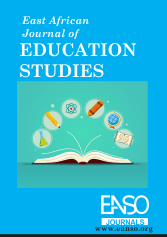Re-contextualising Education for Self-Reliance: Historical Foundations and Contemporary Entrepreneurship Education in Northern Tanzania
Abstract
This study explores the historical evolution and contemporary relevance of Tanzania’s Education for Self-Reliance (ESR) in shaping entrepreneurship education among universities in Northern Tanzania. Using a historical-analytical approach supported by documentary review and empirical data, the findings reveal that current entrepreneurship programs are heavily influenced by Western business models, often emphasising individualism and market competitiveness while neglecting ESR’s core values of community service, ethical labour, and context-based learning. The study shows that this disjuncture has contributed to a persistent mismatch between higher education and employability, limiting the transformative potential of entrepreneurship training. Nevertheless, ESR’s principles of practical education, collective responsibility, and cultural relevance remain critical for reorienting curricula towards inclusive and sustainable development. The research contributes to the study by demonstrating how re-contextualising ESR can guide universities in designing value-driven, socially responsive entrepreneurship programs. Practically, it recommends integrating experiential learning, cooperative enterprise models, and locally relevant innovation to prepare graduates for both self-employment and national development. Overall, the study bridges historical ideology with contemporary educational practice, offering a framework for revitalising higher education in Tanzania.
Downloads
References
Ajzen, I. (1991). The theory of planned behavior. Organizational Behavior and Human Decision Processes, 50(2), 179–211. https://doi.org/10.1016/0749-5978(91)90020-T
Altbach, P. G., & De Wit, H. (2018). The globalization of international higher education. International Higher Education, (95), 2–4. https://doi.org/10.6017/ihe.2018.95.10737
Brock-Utne, B. (2000). Whose education for all? The recolonization of the African mind. Routledge.
Buchert, L. (1994). Education in the development of Tanzania 1919–1990. James Currey.
Chachage, C. S. L., & Mbilinyi, M. (2003). Against neo-liberalism: Gender, democracy and development. E&D Limited Publishers.
Galabawa, J. C. J. (2001). Perspectives in educational management and administration in Tanzania. HakiElimu Working Paper Series.
Haule, E., Nduku, E., & Wambiya, P. (2023). Strategies for cultivating entrepreneurial culture to prepare undergraduates for self-employment in Northern Tanzania. Journal of Research Innovation and Implication in Education, 7(1), 106–116.
Ilomo, O., & Ndyali, L. (2021). Neoliberalism and higher education policy reforms in Tanzania: A critical analysis. Higher Education Policy, 34(1), 101–118. https://doi.org/10.1057/s41307-020-00194-2
Ishumi, A. G. M. (1984). Education and development in Tanzania: A socio-historical perspective. University of Dar es Salaam Press.
Ishumi, A. G. M. (2004). The education sector development programme: Vision, strategies, and challenges. Tanzania Journal of Education and Development, 25(1), 14–28.
Kiambati, K., & Itunga, J. (2020). Cooperative enterprises and sustainable development: Lessons from East Africa. Journal of Co-operative Organization and Management, 8(1), 100124. https://doi.org/10.1016/j.jcom.2019.100124
Kueh, H. S., & Kumburu, N. P. (2021). Entrepreneurship education and intentions among Tanzanian university students. Journal of Entrepreneurship Education, 24(3), 1–12.
Langa, P. V. (2022). Reimagining African universities for sustainable development: Beyond neoliberal logics. International Journal of African Higher Education, 9(1), 55–74. https://doi.org/10.6017/ijahe.v9i1.13831
Langa, P. V., & David, S. (2021). Localized practices and globalized policies in African higher education: Bridging the gap. International Journal of Educational Development, 82, 102371. https://doi.org/10.1016/j.ijedudev.2021.102371
Lukindo, F. (2016). Gender perspectives in entrepreneurship education in Tanzania: Policy implications. International Journal of Gender and Entrepreneurship, 8(2), 210–225. https://doi.org/10.1108/IJGE-07-2015-0028
Mamdani, M. (2007). Scholars in the marketplace: The dilemmas of neo-liberal reform at Makerere University, 1989–2005. Fountain Publishers.
Mbunda, A. S., & Kapinga, A. S. (2021). Entrepreneurship teaching for self-employment among higher learning students in Tanzania: A lesson learnt from successful graduate entrepreneurs. Business Education Journal (BEJ), 10(2), 13. https://www.cbe.ac.tz/be
Mkude, D., Cooksey, B., & Levey, L. A. (2003). Higher education in Tanzania: A case study. Partnership for Higher Education in Africa.
Munene, I. I. (2022). Decentralization and higher education reform in Africa: Lessons from community engagement initiatives. Higher Education Quarterly, 76(1), 34–49. https://doi.org/10.1111/hequ.12287
Munishi, E., & Mwita, K. (2022). Indigenous knowledge and value chain integration for sustainable entrepreneurship in Tanzania. African Journal of Business Management, 16(2), 29–39. https://doi.org/10.5897/AJBM2021.9367
Mwaikokesya, M. J., & Madundo, C. J. (2021). Rethinking higher education curricula: Integrating agribusiness entrepreneurship and community service in Tanzania. Journal of Education and Development, 5(2), 42–58. https://doi.org/10.5296/jed.v5i2.18615
Mwasalwiba, E. S., Dahms, S., & Jablonski, S. (2012). Entrepreneurship education: A review of its objectives, teaching methods, and impact indicators. Education + Training, 54(8/9), 657–672. https://doi.org/10.1108/00400911211274843
Mwasalwiba, E., Dahms, S., & Jablonski, S. (2012). Entrepreneurship education in Tanzanian universities: Influencing factors and challenges. Journal of Entrepreneurship Education, 15, 123–138.
Mwasalwiba, E., & Katunzi, T. (2021). Towards socially responsive entrepreneurship education in Tanzania: Insights for curriculum design. Journal of Entrepreneurship in Emerging Economies, 13(3), 451–470. https://doi.org/10.1108/JEEE-10-2020-0345
Ngowi, H. P. (2009). Promoting entrepreneurship through education in Tanzania. REPOA Policy Brief, 13. https://www.repoa.or.tz/wp-content/uploads/2020/07/13.pdf
Ngowi, H. P. (2009). Economic development and entrepreneurship: New frameworks for Africa. African Journal of Economic Policy, 16(2), 23–41.
Ndlovu-Gatsheni, S. J. (2021). Decolonization, development and knowledge in Africa: Turning over a new leaf. Routledge. https://doi.org/10.4324/9781003017252
Nkonoki, E., & Msuya, R. (2020). Promoting social entrepreneurship education in Tanzanian universities: Challenges and prospects. Journal of Entrepreneurship Education, 23(5), 1–10.
Nyerere, J. K. (1967). Education for self-reliance. Government of Tanzania. https://www.tzonline.org/pdf/educationforselfreliance.pdf
Nyoni, J., & Mabovula, N. N. (2022). Decolonizing the curriculum: African philosophy and education transformation. Educational Philosophy and Theory, 54(4), 457–470. https://doi.org/10.1080/00131857.2020.1849050
Omari, I. M. (1976). The implementation of education for self-reliance in Tanzania: Policy and practice. Comparative Education, 12(3), 165–173. https://doi.org/10.1080/0305006760120303
Salmi, J., & Bassett, R. M. (2022). Rethinking access, quality, and relevance: A framework for the future of African higher education. Journal of Higher Education in Africa, 20(1), 1–20.
Samoff, J., & Carrol, B. (2003). From manpower planning to the knowledge era: World Bank policies on higher education in Africa. UNESCO Forum on Higher Education Research and Knowledge. https://unesdoc.unesco.org/ark:/48223/pf0000146825
Tikly, L. (2020). Education for sustainable development in Africa: Building resilience, peace, and justice. Comparative Education, 56(2), 272– 289. https://doi.org/10.1080/03050068.2020.1723295
Vavrus, F., & Bartlett, L. (2013). Critical approaches to comparative education: Vertical case studies from Africa, Europe, the Middle East, and the Americas. Palgrave Macmillan.
Zgaga, P. (2014). Rethinking higher education reforms in Europe and Africa: From market-driven models to context-sensitive paradigms. Comparative Education, 50(4), 405–418. https://doi.org/10.1080/03050068.2014.957571
Copyright (c) 2025 Irene Gabriel Ndossi, Edgar Leonard Haule

This work is licensed under a Creative Commons Attribution 4.0 International License.




























